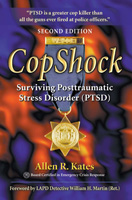
CopShock: Second Edition
Surviving Posttraumatic Stress Disorder (PTSD)
by Allen R. Kates, MFAW, BCECR
Treatment Centers for PTSD
There are many good treatment centers available to the general public for treating alcohol and drug addiction, depression, eating disorders and Posttraumatic Stress Disorder. Some of those centers will be described here eventually, but at the moment, the following information is specifically for police officers, firefighters and other first responders, as there are few facilities for them exclusively.
* * *
Treatment facilities available for treating alcohol and drug addiction, depression and eating disorders, among other things, often treat reactions to trauma and PTSD. But ask to be sure that trauma treatment is a priority for them. If you are suffering from drug addiction, you can often just tell them you wish to deal with alcoholism, which is a more acceptable addiction as far as departments are concerned. After you arrive, tell them your problem and you will be treated for drugs, and it will likely be kept confidential.
At one time, there were several treatment centers focused on helping police officers and emergency services personnel exclusively. There are two areas of thought on this subject. Many cops don’t want to interact with civilians when they are being treated, especially if they would end up mingling with drug addicts who they would typically arrest. They want fellow cops around them who understand what they are going through. On the other hand, many police officers want to get away from being with other cops so they can heal and not feel any peer pressure.
Whatever your feelings on the matter, this conflict has been largely taken out of your hands. After HMOs took over the medical field, most of the treatment centers that catered to police and emergency services people were forced into diversifying or closing.
There are now only two treatment centers in the United States that cater exclusively to first responders, police, fire, EMS and other human services personnel. Ask your peer support people for their treatment program and facility suggestions. Not every program is suitable for every person, so ask a lot of questions before you consider going. Although the following treatment centers are located on the east and west coasts, anyone who is in emergency services anywhere in the United States, including police dispatchers, can attend their programs.
On-Site
Academy—Massachusetts
The On-Site Academy is a non-profit
residential treatment and training center for critical incident stress
management. The Academy serves emergency service workers who are in distress,
and the program is for all law enforcement, fire service, EMS, or other human
service personnel who are temporarily overwhelmed by the stress of their jobs,
by what they have seen, and what they have been through.
The Massachusetts
based Academy helps them get back to the job or to a new beginning and quality
of life with the tools necessary to master critical incident stress. The On-Site
Academy has a skilled staff of licensed clinicians, CISM Advanced trained peers,
national trauma consultants, and additional support staff from Police, Fire and
Emergency Medical Services.
Go to: http://onsiteacademy.org. Phone:
978-632-3518. Page: 781-553-0542 or 978-245-1199. E-mail: kims@onsiteacademy.org.
West Coast Post-Trauma Retreat
(WCPR)—California
The WCPR program is for first responders
whose lives have been impacted by their work experience. The WCPR residential
program provides an educational experience designed to help current and retired
first responders recognize the signs and symptoms of work-related stress
including Posttraumatic Stress Disorder (PTSD) in themselves and in
others.
Licensed clinicians, chaplains, and peer support members from
police, fire and EMS make up the clinical team and volunteer their services.
WCPR’s goal is to help emergency service professionals and retirees regain
control over their lives and either return to work with a new perspective on
stress and coping, move on with their lives if that is a more appropriate
decision, or simply enjoy retirement.
Go to: http://www.wcpr2001.org. Phone:
415-721-9789. E-mail: wcpr2001@aol.com.